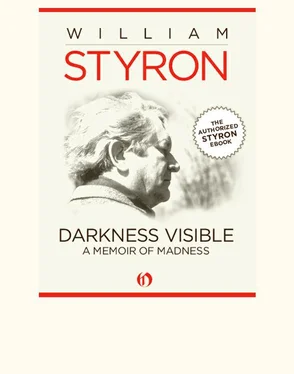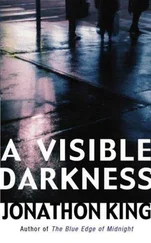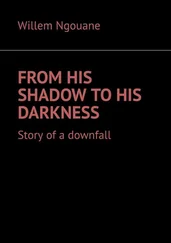William Styron - Darkness Visible
Здесь есть возможность читать онлайн «William Styron - Darkness Visible» весь текст электронной книги совершенно бесплатно (целиком полную версию без сокращений). В некоторых случаях можно слушать аудио, скачать через торрент в формате fb2 и присутствует краткое содержание. Город: New York, Год выпуска: 2010, ISBN: 2010, Издательство: Open Road Integrated Media, Жанр: Биографии и Мемуары, Психология, на английском языке. Описание произведения, (предисловие) а так же отзывы посетителей доступны на портале библиотеки ЛибКат.
- Название:Darkness Visible
- Автор:
- Издательство:Open Road Integrated Media
- Жанр:
- Год:2010
- Город:New York
- ISBN:978-1-936317-29-5
- Рейтинг книги:5 / 5. Голосов: 1
-
Избранное:Добавить в избранное
- Отзывы:
-
Ваша оценка:
- 100
- 1
- 2
- 3
- 4
- 5
Darkness Visible: краткое содержание, описание и аннотация
Предлагаем к чтению аннотацию, описание, краткое содержание или предисловие (зависит от того, что написал сам автор книги «Darkness Visible»). Если вы не нашли необходимую информацию о книге — напишите в комментариях, мы постараемся отыскать её.
Darkness Visible — читать онлайн бесплатно полную книгу (весь текст) целиком
Ниже представлен текст книги, разбитый по страницам. Система сохранения места последней прочитанной страницы, позволяет с удобством читать онлайн бесплатно книгу «Darkness Visible», без необходимости каждый раз заново искать на чём Вы остановились. Поставьте закладку, и сможете в любой момент перейти на страницу, на которой закончили чтение.
Интервал:
Закладка:
Neither by will nor by choice had I became an abstainer; the situation was puzzling to me, but it was also traumatic, and I date the onset of my depressive mood from the beginning of this deprivation. Logically, one would be overjoyed that the body had so summarily dismissed a substance that was undermining its health; it was as if my system had generated a form of Antabuse, which should have allowed me to happily go my way, satisfied that a trick of nature had shut me off from a harmful dependence. But, instead, I began to experience a vaguely troubling malaise, a sense of something having gone cockeyed in the domestic universe I’d dwelt in so long, so comfortably. While depression is by no means unknown when people stop drinking, it is usually on a scale that is not menacing. But it should be kept in mind how idiosyncratic the faces of depression can be.
It was not really alarming at first, since the change was subtle, but I did notice that my surroundings took on a different tone at certain times: the shadows of nightfall seemed more somber, my mornings were less buoyant, walks in the woods became less zestful, and there was a moment during my working hours in the late afternoon when a kind of panic and anxiety overtook me, just for a few minutes, accompanied by a visceral queasiness—such a seizure was at least slightly alarming, after all. As I set down these recollections, I realize that it should have been plain to me that I was already in the grip of the beginning of a mood disorder, but I was ignorant of such a condition at that time.
When I reflected on this curious alteration of my consciousness—and I was baffled enough from time to time to do so—I assumed that it all had to do somehow with my enforced withdrawal from alcohol. And, of course, to a certain extent this was true. But it is my conviction now that alcohol played a perverse trick on me when we said farewell to each other: although, as everyone should know, it is a major depressant, it had never truly depressed me during my drinking career, acting instead as a shield against anxiety. Suddenly vanished, the great ally which for so long had kept my demons at bay was no longer there to prevent those demons from beginning to swarm through the subconscious, and I was emotionally naked, vulnerable as I had never been before. Doubtless depression had hovered near me for years, waiting to swoop down. Now I was in the first stage—premonitory, like a flicker of sheet lightning barely perceived—of depression’s black tempest.
I was on Martha’s Vineyard, where I’ve spent a good part of each year since the 1960s, during that exceptionally beautiful summer. But I had begun to respond indifferently to the island’s pleasures. I felt a kind of numbness, an enervation, but more particularly an odd fragility—as if my body had actually become frail, hypersensitive and somehow disjointed and clumsy, lacking normal coordination. And soon I was in the throes of a pervasive hypochondria. Nothing felt quite right with my corporeal self; there were twitches and pains, sometimes intermittent, often seemingly constant, that seemed to presage all sorts of dire infirmities. (Given these signs, one can understand how, as far back as the seventeenth century—in the notes of contemporary physicians, and in the perceptions of John Dryden and others—a connection is made between melancholia and hypochondria; the words are often interchangeable, and were so used until the nineteenth century by writers as various as Sir Walter Scott and the Brontës, who also linked melancholy to a preoccupation with bodily ills.) It is easy to see how this condition is part of the psyche’s apparatus of defense: unwilling to accept its own gathering deterioration, the mind announces to its indwelling consciousness that it is the body with its perhaps correctable defects—not the precious and irreplaceable mind—that is going haywire.
In my case, the overall effect was immensely disturbing, augmenting the anxiety that was by now never quite absent from my waking hours and fueling still another strange behavior pattern—a fidgety restlessness that kept me on the move, somewhat to the perplexity of my family and friends. Once, in late summer, on an airplane trip to New York, I made the reckless mistake of downing a scotch and soda—my first alcohol in months—which promptly sent me into a tailspin, causing me such a horrified sense of disease and interior doom that the very next day I rushed to a Manhattan internist, who inaugurated a long series of tests. Normally I would have been satisfied, indeed elated, when, after three weeks of high-tech and extremely expensive evaluation, the doctor pronounced me totally fit; and I was happy, for a day or two, until there once again began the rhythmic daily erosion of my mood—anxiety, agitation, unfocused dread.
By now I had moved back to my house in Connecticut. It was October, and one of the unforgettable features of this stage of my disorder was the way in which my old farmhouse, my beloved home for thirty years, took on for me at that point when my spirits regularly sank to their nadir an almost palpable quality of ominousness. The fading evening light—akin to that famous “slant of light” of Emily Dickinson’s, which spoke to her of death, of chill extinction—had none of its familiar autumnal loveliness, but ensnared me in a suffocating gloom. I wondered how this friendly place, teeming with such memories of (again in her words) “Lads and Girls,” of “laughter and ability and Sighing, / And Frocks and Curls,” could almost perceptibly seem so hostile and forbidding. Physically, I was not alone. As always Rose was present and listened with unflagging patience to my complaints. But I felt an immense and aching solitude. I could no longer concentrate during those afternoon hours, which for years had been my working time, and the act of writing itself, becoming more and more difficult and exhausting, stalled, then finally ceased.
There were also dreadful, pouncing seizures of anxiety. One bright day on a walk through the woods with my dog I heard a flock of Canada geese honking high above trees ablaze with foliage; ordinarily a sight and sound that would have exhilarated me, the flight of birds caused me to stop, riveted with fear, and I stood stranded there, helpless, shivering, aware for the first time that I had been stricken by no mere pangs of withdrawal but by a serious illness whose name and actuality I was able finally to acknowledge. Going home, I couldn’t rid my mind of the line of Baudelaire’s, dredged up from the distant past, that for several days had been skittering around at the edge of my consciousness: “I have felt the wind of the wing of madness.”
Our perhaps understandable modern need to dull the sawtooth edges of so many of the afflictions we are heir to has led us to banish the harsh old-fashioned words: madhouse, asylum, insanity, melancholia, lunatic, madness. But never let it be doubted that depression, in its extreme form, is madness. The madness results from an aberrant biochemical process. It has been established with reasonable certainty (after strong resistance from many psychiatrists, and not all that long ago) that such madness is chemically induced amid the neurotransmitters of the brain, probably as the result of systemic stress, which for unknown reasons causes a depletion of the chemicals norepinephrine and serotonin, and the increase of a hormone, cortisol. With all of this upheaval in the brain tissues, the alternate drenching and deprivation, it is no wonder that the mind begins to feel aggrieved, stricken, and the muddied thought processes register the distress of an organ in convulsion. Sometimes, though not very often, such a disturbed mind will turn to violent thoughts regarding others. But with their minds turned agonizingly inward, people with depression are usually dangerous only to themselves. The madness of depression is, generally speaking, the antithesis of violence. It is a storm indeed, but a storm of murk. Soon evident are the slowed-down responses, near paralysis, psychic energy throttled back close to zero. Ultimately, the body is affected and feels sapped, drained.
Читать дальшеИнтервал:
Закладка:
Похожие книги на «Darkness Visible»
Представляем Вашему вниманию похожие книги на «Darkness Visible» списком для выбора. Мы отобрали схожую по названию и смыслу литературу в надежде предоставить читателям больше вариантов отыскать новые, интересные, ещё непрочитанные произведения.
Обсуждение, отзывы о книге «Darkness Visible» и просто собственные мнения читателей. Оставьте ваши комментарии, напишите, что Вы думаете о произведении, его смысле или главных героях. Укажите что конкретно понравилось, а что нет, и почему Вы так считаете.












